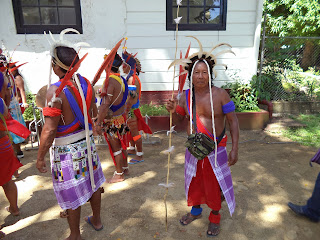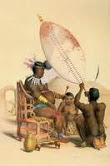Suriname's new dawn is rising and new hopes are soaring sky high. The victorious party in Suriname's May 25th election is definitely the National Democratic Party led by President D. D. Bouterse. Recent election results show that the V7 coalition led by C. Santokhi has lost while V7 coalition is said to fall apart after internal tensions started surfacing.
Indigenous Surinamese in festive dress
Understanding Surinamese politics is easy if one understands the workings of a post colonial political system traditionally based mainly on divide and rule, and ethnic affiliations to politics and power. Suriname was colonized by the British, French and Dutch for more than three centuries and the process of decolonization has only recently begun in 1975, when Suriname became an independent republic.
19th century painting of Dutch slaveship in Paramaribo
Today's generation of young post revolution politicians in Suriname wants to be part of global developments and presents Surname as an independent nation. Suriname's young voter generation wants to connect with the economic, social and political advances made by newly independent nations who finally control their own natural resources. South-South cooperation and BRICS oriented development will replace the traditionally European focus in Suriname. Expectations are high and the refusal to accept any delay in progressive development and sharing of wealth, puts a lot of pressure on any to be formed next government .
Surinamese young men from Saramacca district
After all, voters expect that the promises made during the election campaign trail will materialize. In spite of attempts by the opposition to belittle the political awareness and choice of the majority of Surinamese voters, it is clear the majority vote given to Bouterse to reign five more years, has a lot to do with expectations people have that his new approach might lead to satisfactory results.
Surinamese youths in Saramacca District
Suriname is going through a period of transition in which fundamental changes in education, economics and production are geared towards shaking off heavy burdens belonging to our colonial past. In an attempt to reinvent our own values, the Surinamese voters have said yes to policies of change and modern development .
Capital Paramaribo view of H.J.Arron street
Most Surinamese voters understood that investment must be given time to yield results. Increase in productivity and development of workers, teachers, nurses and owners of factories, offices and companies is expected to result in change both nationally and internationally. Surinamese voters after all want better living conditions and greater wealth for all Surinamese.
Madamme Jeanette fresh peppers
Export quality Surinamese Ocra
The choice to unite and profit from all cultural and ethnic skills and knowledge available in our
population was the best choice and the voters who are mostly young voters have definitely made that choice .The historic first ever win of one party with a multi-ethnic and pro-Caribbean/Latin American orientation has left the traditional coalition of ethnically based Europe focused parties without weapons to fight the new situation. The first ever newly elected parliament with a record number of women is another victory for the advocates of change in Suriname.
Indigenous Surinamese women in festive dress
The fact remains however. that identification of more than 300.000 Dutch Surinamese in Europe, with Surinamese in the Caribbean, will continue to affect the Surinamese decolonization process. New media and global village awareness will make the decolonization of Surinamese minds a dynamic and life changing experience.
Colonial buste in Presidential palace gardens
There are many ways to interpret the election results, but general view is that a definite breech has been made with the way politics were done in the past. It is up to the next generation to do better and to give the voters what they need. A one party controlled parliament with an increased number of women is expected to deliver top notch laws and must represent voters who gave them the chance to do their job.
Javanese and Carib inhabitants of Suriname
In a few months it will become clear if the voters were right and if the new government is able to do the many jobs that lay ahead. For now everyone in Suriname is trying to get used to the new political climate of change and young energetic expectations.
 Guests, visitors and residents who have tasted the friendliness, inhaled the fresh air and relaxed in open camps have first hand experience of our slogan RELAX AND LEARN. They know what you will find when you take a turn to the Hendrik Jan Tjoe Nij road
Guests, visitors and residents who have tasted the friendliness, inhaled the fresh air and relaxed in open camps have first hand experience of our slogan RELAX AND LEARN. They know what you will find when you take a turn to the Hendrik Jan Tjoe Nij road 








































